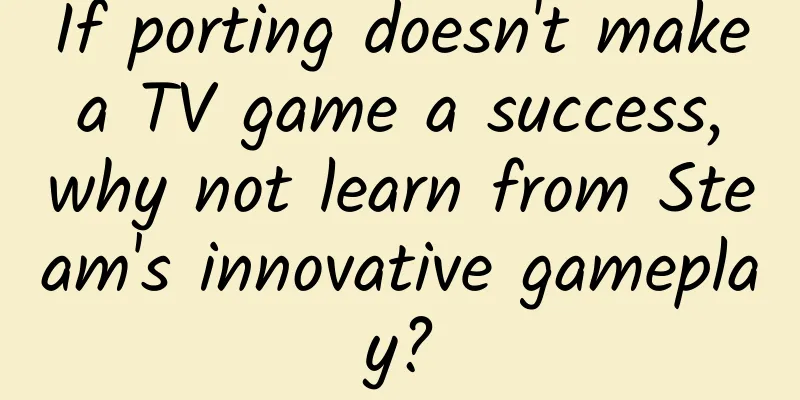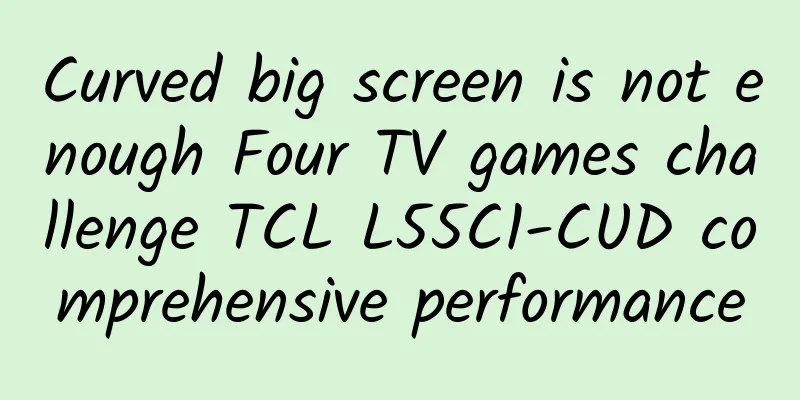If porting doesn't make a TV game a success, why not learn from Steam's innovative gameplay?

|
Android TV game, this term has long become a short-lived negative example in the eyes of most domestic gamers. In recent years, with the opening of the market, major game manufacturers have flocked into this blank market, but due to deviations in thinking and action, the performance of TV games has been disappointing. However, this is not a problem with Android smart TVs themselves. What deviation has caused the industry, which was once expected to flourish, to become so lifeless? Copying, transplanting and copying are the biggest failures Early Android TV games suffered from the hardware defects of smart TVs, which made it difficult to run medium and heavy games. At the same time, the lack of content also made many manufacturers rack their brains. For a new blue ocean, how to quickly occupy the market and fill the content was the fastest shortcut to porting mobile games. As a result, many popular games on mobile terminals were constantly moved to large-screen TVs, hoping to replicate the glory of mobile games. After all, TV screens are different from mobile phones. Even if they are both based on the Android system, there are still more or less problems with the picture and operation after simple adaptation. Although after a year of development, the standardized regulations for adaptation and the rapid update of smart TV hardware have gradually solved the adaptation problem, the fragmented leisure of mobile games still cannot allow players to get a new experience on the TV screen. As time goes by, many ambitious manufacturers have withdrawn or switched to mobile games, and the entire industry has turned from hot to cold. Why? Transplantation is not the solution. At this stage, Android TV games are directly labeled as "copycat". For example, in the horizontal shooting game "Knight of So-and-so", the proportions of the game characters are obviously the design style of mobile games. The mobile phone screen is small and the character proportions are large. There is nothing wrong with such a design, but the TV screen is as small as 30 inches and as high as 60/70 inches. The large-proportioned character design is not only rough, but also takes up too much screen space, which not only affects the operating experience, but also reduces the player's aesthetic taste. In the early days of TV game development, porting did help fill in the gaps in content, but this also led to more than half of the 100 games in a game hall being ported from mobile games, and the remaining half being rehashed games such as The King of Fighters, Super Mario, and Contra. Original and exclusive games were pitifully rare. The lack of game content that attracts players has led to a small user base and low user stickiness for Android TV games, which in turn dampened the enthusiasm of developers. This has invisibly formed a vicious cycle, turning the blue ocean into a dead sea. How should video games develop in the future? After more than a year of brutal trials, the once bustling TV game industry has entered a cold winter period. Many manufacturers have withdrawn, but some manufacturers still believe that there is hope for rise and stick to Android TV games. After continuous development, TV games have also made a qualitative leap in quality. The introduction of IP, the trend of legalization and heavy-duty development have made TV games show signs of recovery. However, it still cannot erase the public's low view of TV games. To put it bluntly, the remaining Android TV game manufacturers are still following the old path. Heavy, genuine and even high-quality games still come from mobile games. Even if they are independently developed, there is a suspicion of copying, and the first to land on the mobile terminal is also the mobile terminal, under the euphemism of: testing the waters for TV games. Although the picture effect experience has been improved, there is no novelty, and games that are "understood in seconds" will not be followed by players.
So, if our TV games cannot compete with "GTA" and "Uncharted" in terms of picture quality and technology, why can't we compete with the game giants in terms of game creativity? There are many games on Steam that succeeded by creativity, such as "Shovel Knight", "Don't Starve", "Stardew Valley", etc., with sales of tens of thousands and popularity not less than 3A masterpieces. Looking at the independent games on the Steam platform, most of the developers are small teams or individuals, the cost of game development is not high, and the game size is controlled within a few hundred MB. This is very similar to the entrepreneurial environment of domestic TV games, but the biggest difference lies in the attitude towards games. At this stage, China's Android TV game manufacturers have teams, talents and technologies. Instead of copying and porting mobile games in a short period of time to gain a little profit, they can fully utilize high-quality resources and refer to Steam's cases to independently develop some creative works. Today's Android TV game development path is too narrow, and the development method is somewhat deformed. It is not too late to change at present. By referring to the route of Steam's boutique games and producing creative works, Android TV games will also embark on a unique development path. As a winner of Toutiao's Qingyun Plan and Baijiahao's Bai+ Plan, the 2019 Baidu Digital Author of the Year, the Baijiahao's Most Popular Author in the Technology Field, the 2019 Sogou Technology and Culture Author, and the 2021 Baijiahao Quarterly Influential Creator, he has won many awards, including the 2013 Sohu Best Industry Media Person, the 2015 China New Media Entrepreneurship Competition Beijing Third Place, the 2015 Guangmang Experience Award, the 2015 China New Media Entrepreneurship Competition Finals Third Place, and the 2018 Baidu Dynamic Annual Powerful Celebrity. |
<<: Wei Jianli of Ingenic Group: Challenges facing IoT chips
>>: Apple die-hard fan: I'm worried that Apple will become another BlackBerry
Recommend
What is the paid search effect? Here are four revelations for corporate promotion
"I know that half of my advertising expenses...
Android development SMS verification code example
Before talking about the knowledge point of SMS v...
After promoting tens of millions of information flows, I have summarized these 6 experiences!
In today's mobile Internet era, we receive a ...
The State Administration of Radio, Film and Television interviewed the license holders and stressed the need to strictly punish cross-border behavior
According to sources, the State Administration of...
Firefox for Android is testing credit card and address autofill features
After switching to Fenix, Mozilla has added most ...
Momo Live Personal Anchor Membership Operation Guide
Personal anchor membership operation guide Indivi...
The second week after "positive" is very important! If these 4 symptoms appear, it may turn into a serious condition!
Fever, cough after infection... The first week of...
Kuaishou Advertising Creative Guide for 2019!
Driven by multiple forces including users, platfo...
Why is there a ball on the roof? So many people don't know
Audit expert: Luo Huiqian Associate Researcher, I...
Regarding the knowledge point of adaptation, this article will help you master it thoroughly!
Orange's Orange: I remember when I first star...
How to systematically design online and offline brand activities?
Different from daily operational activities, offl...
WeChat 8.0.1 is here! Finally, you can display your online status
On January 21, WeChat ushered in a major version ...
Doctors urgently remind: Erythromycin ointment must not be used for a long time! Tell your family members immediately
Experts in this article: Wang Wei, Deputy Directo...
Is there really life on Enceladus? Chinese scientists found the last piece of the puzzle
Enceladus is the second satellite of Saturn disco...
Orange cat super short combat crash course (first period)
Resource introduction of Orange Cat Super Short P...









